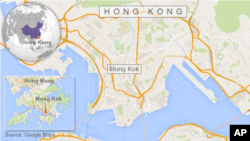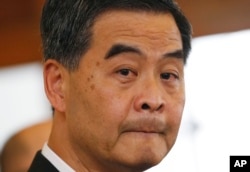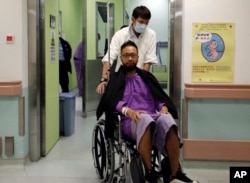Hours after Hong Kong leader Leung Chun-ying announced his government is seeking negotiations with democracy protesters, tensions flared again at dawn in the semi-autonomous Chinese city. Hundreds of police officers moved onto the streets of Kowloon, removing barricades in an effort to end the occupation of Mong kok shopping district, the scene of violent confrontations between police, democracy protesters and pro-Beijing elements in the last 19 days.
Riot police and cranes on trucks moved into Mong kok at 5 a.m. Friday. While officers insisted they were removing obstructions on the road and not the protest camp itself, a young activist who wished to remain anonymous said she and her friends were disappointed by the police action.
“I saw them violently clear some of the tents, and they blocked some of my friends’ tents. They did not need to do that - they are very good at lying to themselves. We are so angry,” stated one observer.
Police moved in scarcely 12 hours after Leung Chun-ying attempted to reopen dialogue with students and other protest groups, a week after his government unilaterally withdrew from the negotiation process.
Hong Kong Federation of Students leader Alex Chow queried Leung’s sincerity in offering talks. He said the proposal was inconsistent with police orders to clear the streets and the government's refusal to provide constitutional alternatives to Beijing’s decision to vet candidates for elections in 2017 - the main catalyst for the three-week occupation.
“Hong Kong people and students have provided different possibilities for the government to solve the current problem. But we cannot see any concrete proposals by the government, so it really depends on them if there will be any results from constructive dialogues held,” Chow said.
Accusations also continue to fly in relation to the brutal assault on Civic Party activist and social worker Ken Tsang, who, it emerged, flew back to Hong Kong from a 9 month visit to South America expressly to participate in the constitutional protests.
Civic Party legislator Ronny Tong said although he felt Leung’s negotiation offer will achieve little politically, it may calm tensions that escalated after footage of the attack on Tsang was broadcast around the world Wednesday.
“What happened two nights ago has helped to raise temperatures yet again. I can’t say I expect a lot of progress to come out of the talks. But the sooner they sit down, the quicker the temperature will die down a little bit. So I really hope the parties can meet Monday or Tuesday,” said Tong.
Attention now returns to the main Admiralty demonstration site in the heart of Hong Kong’s business district. Pro-establishment parties insist the protests centered here are most harmful to the Hong Kong economy.
However, a growing body of analysis cited in Friday's Wall Street Journal suggests the long-term economic effect will be minimal, with tourist numbers and trade figures holding up well.
Local corporate governance expert David Webb adds that extended suffrage in Hong Kong should actually help improve prosperity. He told local media there is no large-scale economy that is prosperous that does not enjoy democracy.
“Eventually, China is going to be a democracy itself, or it is not going to get the levels of prosperity its people desire. Most people understand that if you want free markets and the benefit of competition, then you also want that in your leadership; they almost go hand in hand,” Webb noted.
Protester numbers are again swelling in the central district as the now traditional weekend of rallies and solidarity meetings approaches. Given that a clear strategy has emerged of police breaking down satellite protest camps each night this week, the government now faces the headache of what to do about the thousands of protesters entrenched in this last remaining camp, situated in the heart of the city.







